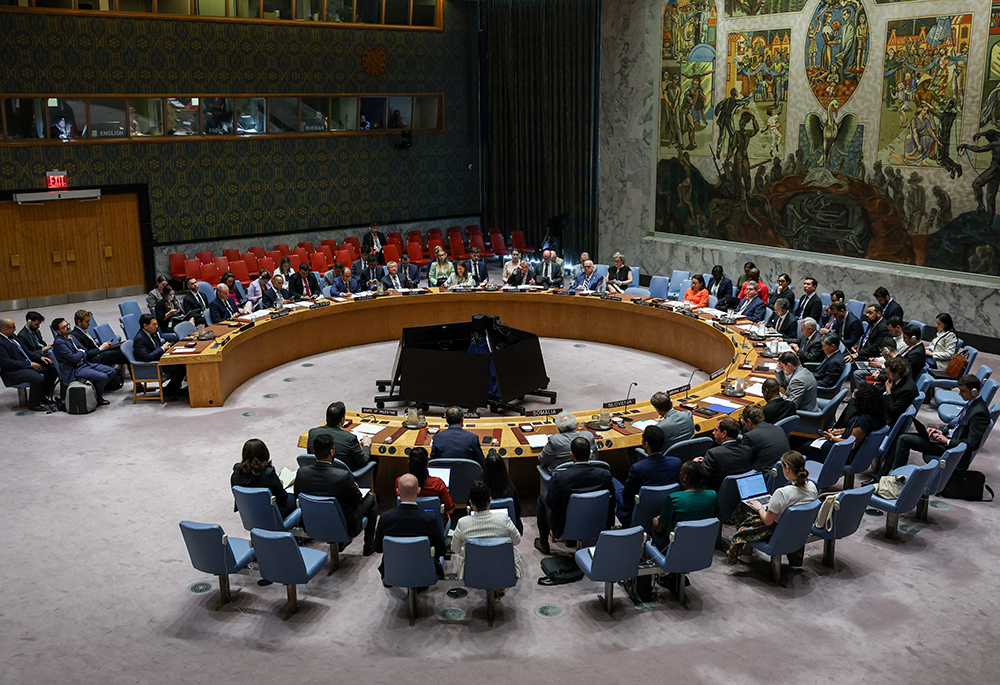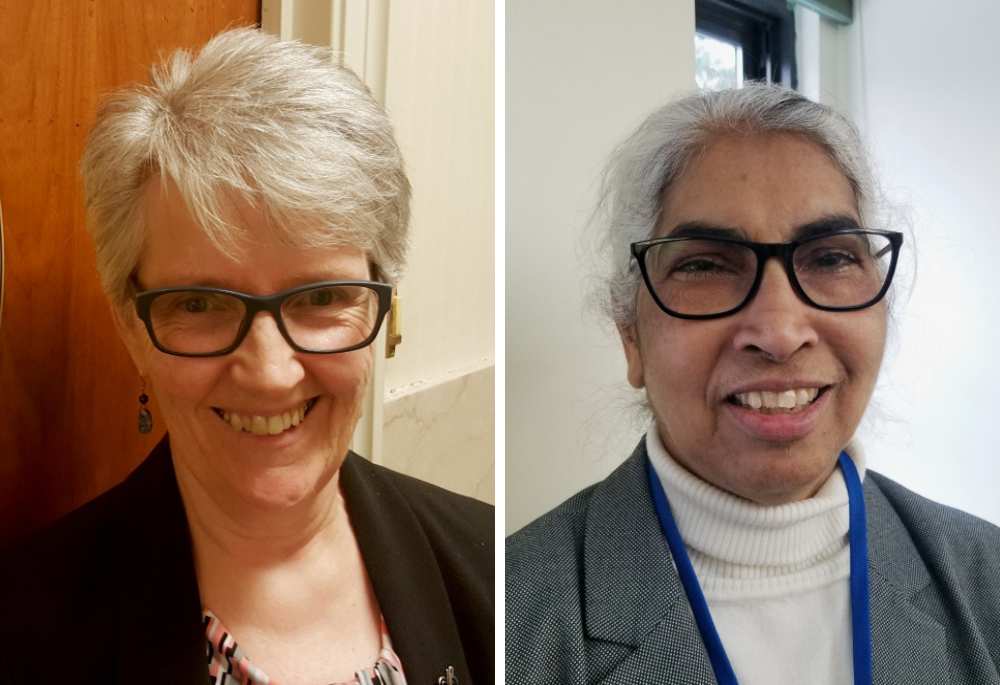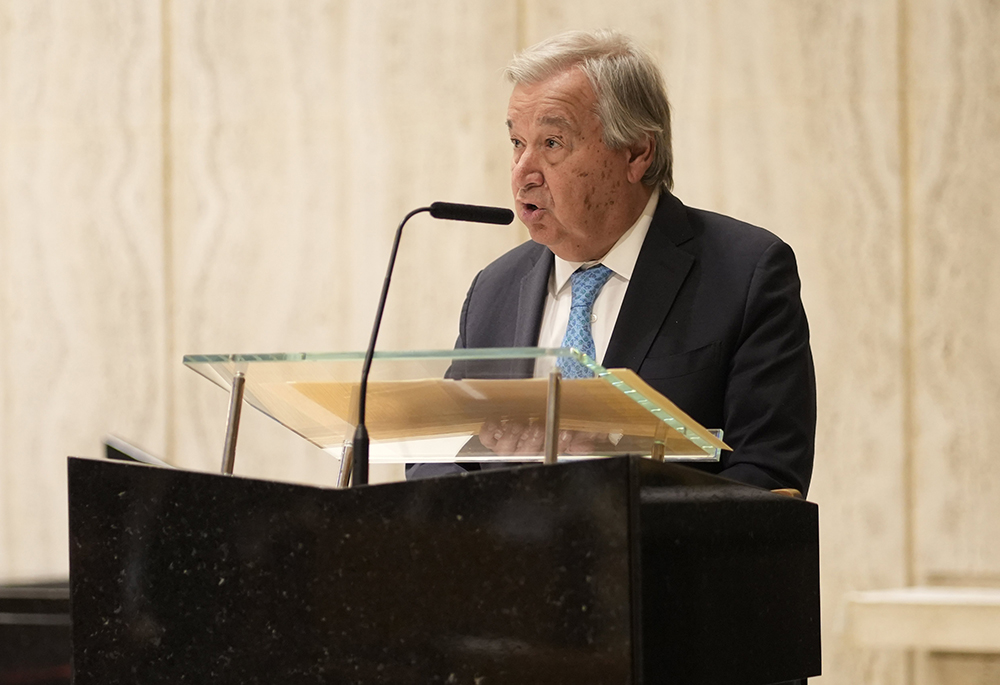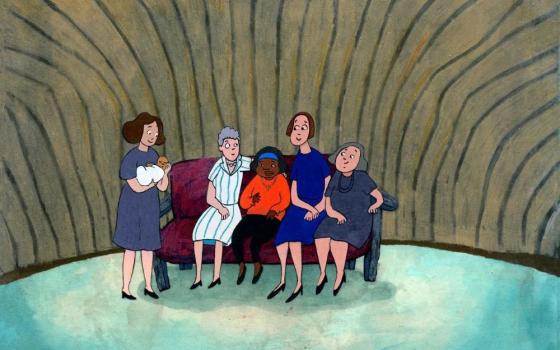
The United Nations Security Council meets about conflicts in the Middle East at U.N. headquarters in New York City, June 30, 2025. (OSV News/Reuters/Kylie Cooper)
Editor's note: This is one in a series of stories about Catholic sisters' advocacy at the United Nations.
In the second of a two-part interview, retired congregational representatives Sr. Winifred Doherty of Ireland, who represented the Good Shepherd International Justice and Peace Office at the United Nations from 2008 to 2024, and Sr. Teresa Kotturan of India, who served as U.N. representative of the Sisters of Charity Federation from 2014 to 2023, reflect on their time at the U.N.
In this interview, the two speak on the successes and frustrations of their ministries; what they see as problems within the U.N.; and the need for structural reforms of the global body.
GSR: What were the greatest successes you had?
Doherty: Having a role in creating the SDGs was one —– how the U.N. welcomed the participation from civil society. The whole process with regard to the SDGs was a particular moment in history that was very powerful.
Another was lifting up and advocating for social protection floors, which are national guarantees of social protections, like rights to health care, education, benefits, child care. Back in 2011, social protections were never heard of at the U.N. But I remember a lecture by Michael Cichon from the ILO [International Labor Organization] who was bringing this forward. To me, that was one answer to the issue of poverty in the world.
I spent a lot of time going to member states, meeting ambassadors, meeting secretaries, trying to push this idea. So it was a case of trying to leverage the knowledge we have and the expertise we have from the ground to the policy level and do what we can to push that forward. And as I look back, I see that tremendous strides were done in implementing this. We have a long way to go but the thought behind it is there.

Sr. Winifred Doherty of Ireland, left, and Sr. Teresa Kotturan of India (GSR file photos)
Kotturan: I came to the U.N. when good things were happening. So the ability to participate in SDG negotiations, Financing for Development [FFD] negotiations, and migration negotiations I consider as successes. Others were in Addis Ababa for the Third International Conference on FFD and in Paris for the Paris climate agreement.
It was also to a certain extent participation in discussions about trafficking against humans. I was able to participate in many civil society engagements. I stretched myself to participate because of my personal interest. And I felt that was very good. And in those days, there were ambassadors who were in the hallways, we could stop, talk to them, give them a note and make sure they heard us. And there was an opening for multilateralism.
Another success story is what we pushed for ending homelessness agenda at the U.N. from a small group and how we engaged the Social Development Commission and got two resolutions. That is a big success story.
And there are so many others, like when the migration documents were being made. I studied from the perspective of inclusion of women, and I saw women were mentioned only once. So I made a statement when we had the opportunity. And after that statement, the Philippines took my statement because they have so many women migrants. And then the Holy See also joined. So we sparked a little fire for others to join.
And the frustrations?
Doherty: The frustrations for me now looking at the U.N. from afar is to find that so much evil is happening in the world, and I'm referring to Palestine and to Ukraine. To have members who are perpetrating these horrible situations actually sitting in the U.N. and holding very powerful positions such that they can veto actions to move forward is abhorrent. I think of Russia when the war began in Ukraine and that they were actually the chair of the Security Council. Or that the United States vetoes anything in regards to Palestine.
I find that tremendously pain-filled, especially as I find myself reflecting on how the U.N. came together post-World War II when the world had such an experience of the horrors of war and people said, "No more war," and the U.N. emerged out of that to be a "peace holder." But the evolution of the United Nations has in some way diluted what was the original founding moment and inspiration of "No more war."
Advertisement
Kotturan: What I see still operating is the U.N. set in the post-World War II times, when the nations said, "No more war," but everything was set in place from the victors' perspective. So the Security Council (long dominated by the U.S., Russia, Great Britain and France) is comprised of the winners, and the winners still hold power.
But the global scenery has changed. So the large powers are unwilling to change the system for the sake of the larger good. Multilateralism has been sacrificed because we are getting more and more autocratic fascist leaders in countries. So now the dynamic is often: "You scratch my back, I scratch your back." That is the attitude. Nobody is willing to give an inch for the benefit of the people living on the margins. So you can create narratives that suit your whims. And what is happening in this country is giving permission for others to imitate.

U.N. Secretary-General António Guterres delivers his remarks during the annual prayer service for U.N. diplomats at Holy Family Church in New York City Sept. 8, 2025. The event, hosted by the Vatican's permanent observer mission to the U.N., took place on the eve of the opening of the 80th session of the U.N. General Assembly. (OSV News/Gregory A. Shemitz)
How does that play out?
Kotturan: There is a lot of "tit-for-tat" actions in the Security Council — it results in utter disregard for the larger U.N. Sometimes I feel pity for [U.N. General-Secretary António Guterres].
Guterres because he has to speak up, but nobody is hearing him. Without the Security Council members agreeing to dismantle the system, there will be no renewed U.N. that will be seen as a multilateral organization where everyone has a voice. Right now, it's horse trading, selling and buying by rich member states.
I've heard you both say something to the effect that even if the U.N. was dismantled it would have to be recreated in some way.
Doherty: The U.N. as a global body committed to peace, human rights and well-being of humanity and the planet has evolved over the past 80 years to the format it has today with 193 member states. It has been a beacon and carrier of ethical and moral values on behalf of humanity and in more recent years on behalf of Mother Earth herself.
But the structure devised then and which has evolved into a complex system is not meeting the needs of peace, people and planet today. It is being manipulated, threatened and held hostage by member states that say they are committed to its highest values but who now fail to live up to that commitment. And today some are outright obstructionists in the work.
While the U.N. system has been gallant in retaining all of its members, its ability to engage in strategic conflict resolution on behalf of the global community for peace, climate change action, sustainability and for peoples is currently very fragile or nonexistent. The way to resolve this is through openness and engaging conflictual member states in effective dialogue and reconciliation for change. Expulsion or exclusion further alienates.
Kotturan: The current structure is nonviable. The existing power imbalances along with a lack of global solidarity to hear the cry of the poor and the cry of the earth, is making the U.N. irrelevant.
The U.N. has shaped global solidarity and interconnectedness over the years. It has provided us with values and principles — a new consciousness on human rights and earth rights — by which global and national governance should be done.
The process of globalization has brought about a sense of global interrelatedness and connectivity. We need a global organization to help us to bring the global together to build a future with peace and prosperity for all humanity and the earth. No one country or a group of countries can achieve that. The global "common good" has to be kept in focus.





